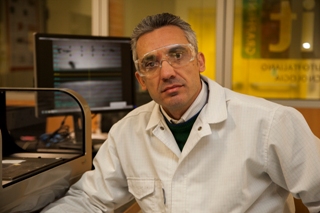Feb 4 2015
Graphene has many potential applications, among them energy generation, conversion and storage. Graphene – a single layer of carbon atoms – and related two-dimensional crystals combine high electrical conductivity with physical flexibility and a huge surface to weight ratio. Such qualities make them suitable for storing electric charge in batteries and supercapacitors, and as catalysts in solar and fuel-cell electrodes.
 Francesco Bonaccorso (c) A. Abrusci, Istituto Italiano di Tecnologia@IIT
Francesco Bonaccorso (c) A. Abrusci, Istituto Italiano di Tecnologia@IIT
A number of energy applications for 2D crystals are under development worldwide, and Europe's Graphene Flagship has invested significant resources in this area. Now, in an article for the journal Science, flagship scientists – together with colleagues in the US and Korea – provide a wide-ranging review of the potential for graphene and related materials in the energy sector. The authors hope that their review will help guide researchers in industry and academia to identify the best routes towards successful applications that benefit society as a whole.
The researchers – led by physicist Francesco Bonaccorso, who is based at the Graphene Labs of the Italian Institute of Technology in Genova, and is a Royal Society Newton Fellow at the Cambridge Graphene Centre – note the substantial progress made in material preparation at the laboratory level. They also highlight the challenge of producing the materials on an industrial scale in a cost-effective manner.
Graphene, the best known of the hundreds of two-dimensional crystals investigated to date, has a very high surface-to-mass ratio. With around 2,600 square metres for every gramme, graphene is all surface and no bulk, and it is this 2D nature which gives graphene its unique electrical, thermal and mechanical properties.
In the review article, the researchers examine the progress made so far – and look ahead to the future potential of 2D crystals in:
- Solar cells
- Thermoelectric devices
- Fuel cells
- Batteries
- Supercapacitors
- Hydrogen production and storage
For a summary of the review’s findings, see http://bit.ly/1z7F3AQ
The researchers conclude that graphene and related two-dimensional crystals may play a major role in future energy conversion and storage technologies. This is an active area of research and development for Graphene Flagship partners, both academic and industrial.
"The huge interest in two-dimensional crystals for energy applications comes both from their physico-chemical properties, and the possibility of producing and processing them in large quantities, in a cost-effective manner," says Bonaccorso.
"In this context, the development of functional inks based on two-dimensional crystals is the gateway for the realisation of new generation electrodes in energy storage and conversion devices." Bonaccorso adds that the challenge ahead is to demonstrate a disruptive technology in which two-dimensional materials not only replace traditional electrodes, but more importantly enable the design of whole new device concepts.
Review co-author Andrea Ferrari, who chairs the Executive Board of the Graphene Flagship, and is director of the Cambridge Graphene Centre, offers a soberly optimistic view of the potential for graphene in this area: "Graphene and Related Materials have great promise in these areas, and the Graphene Flagship has identified energy applications as a key area of investment.
"We hope that our critical overview will guide researchers in academia and industry in identifying optimal pathways toward applications and implementation, with an eventual benefit for society as a whole."